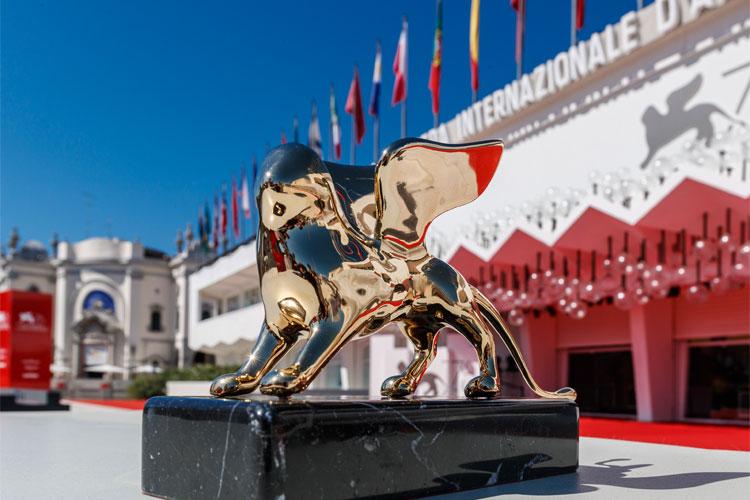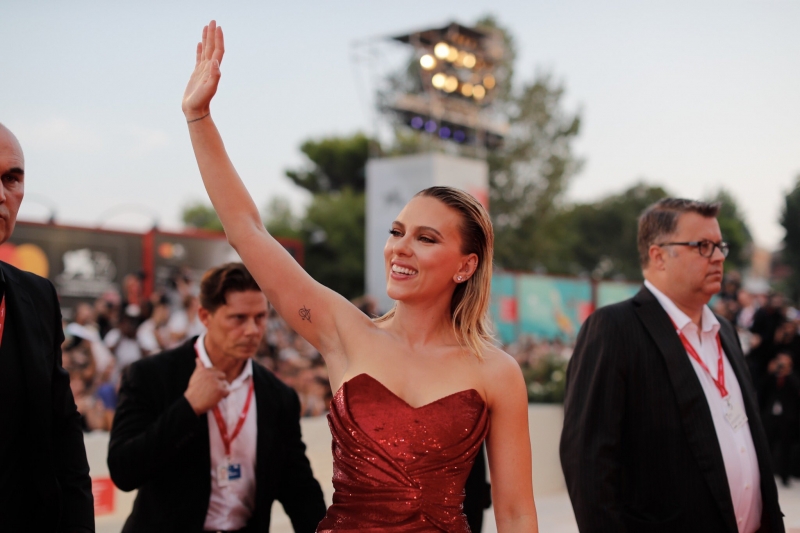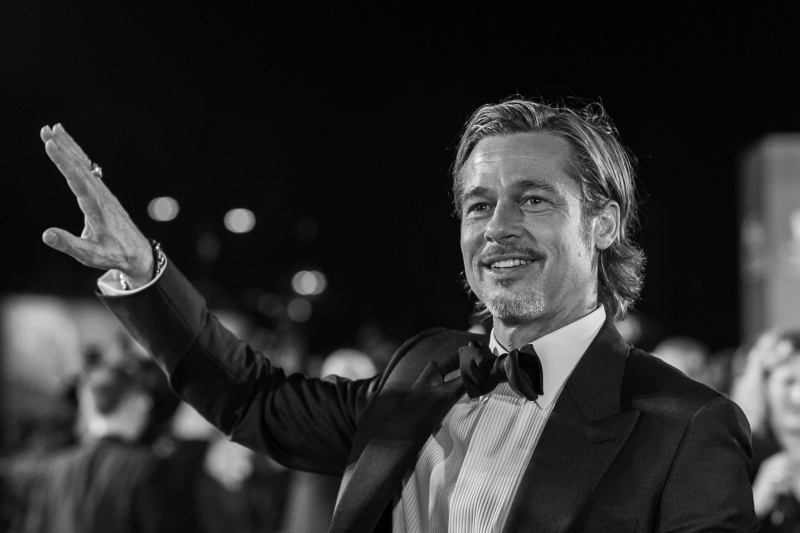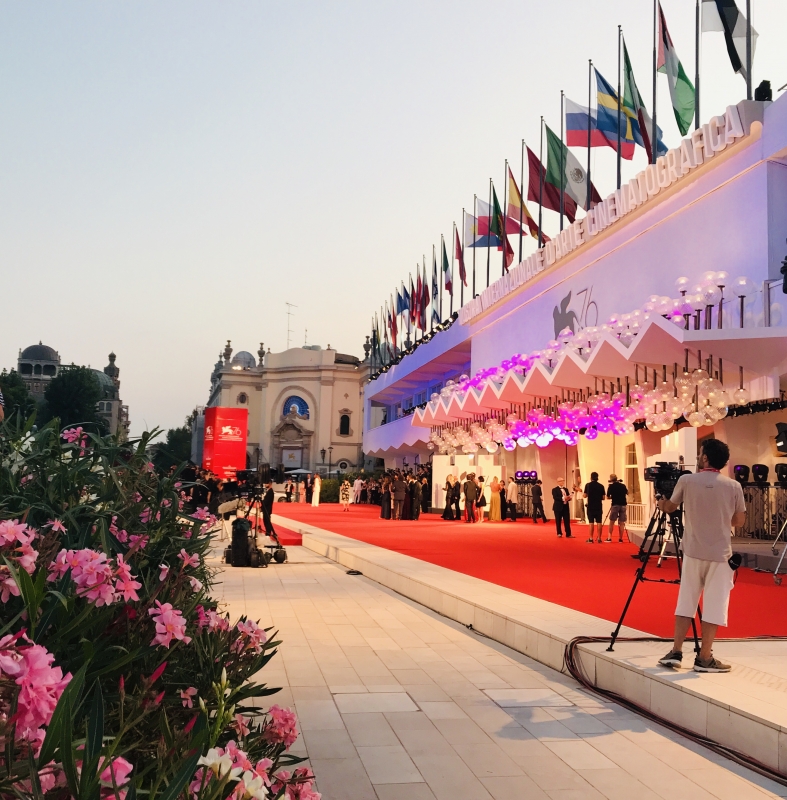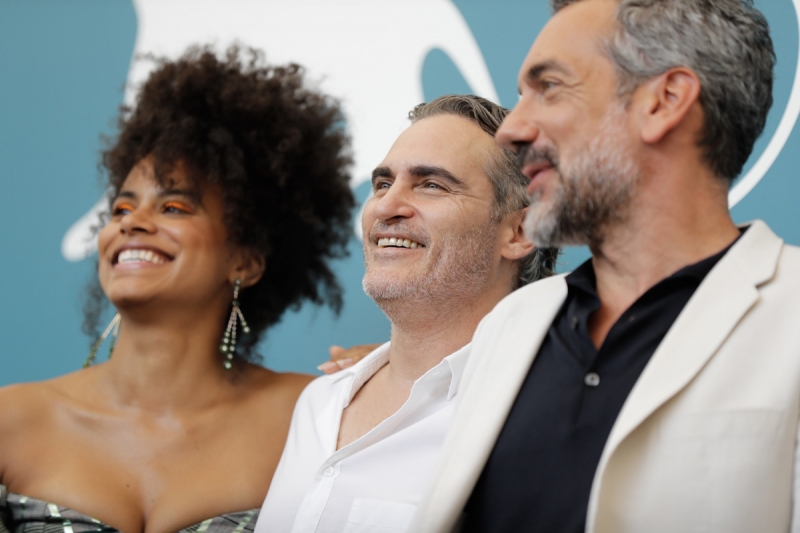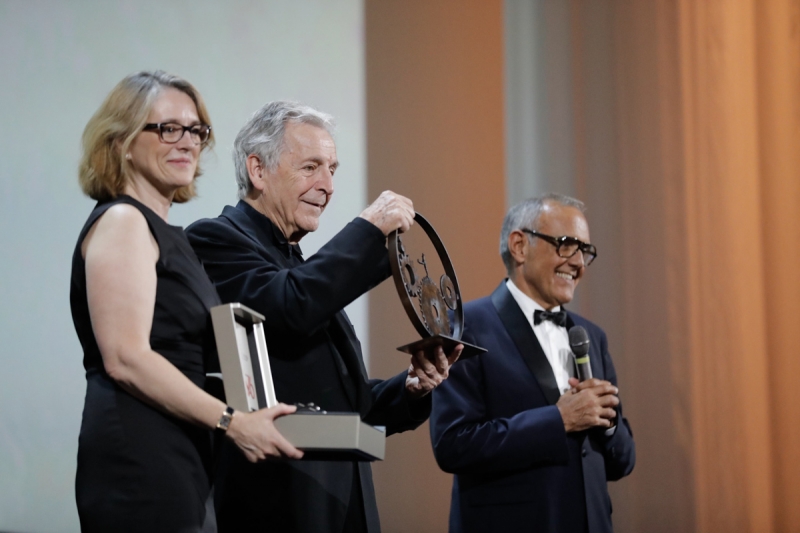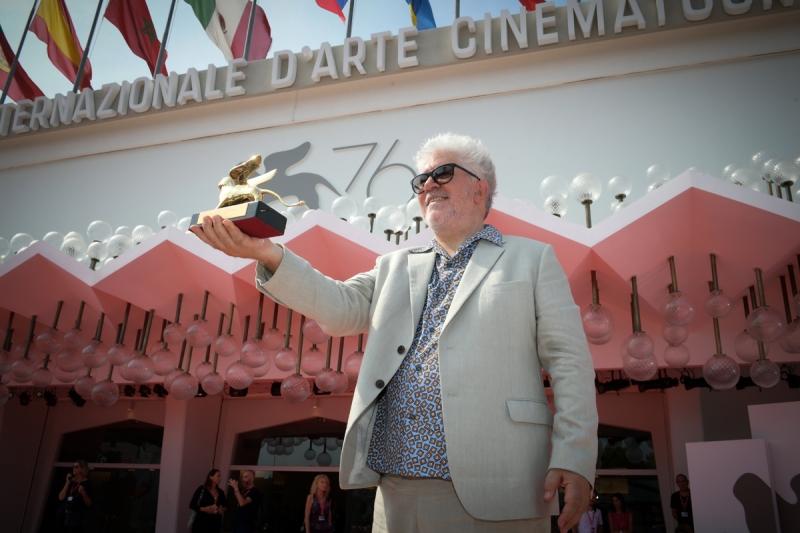|
|
||
|
Pro Tools
FILMFESTIVALS | 24/7 world wide coverageWelcome ! Enjoy the best of both worlds: Film & Festival News, exploring the best of the film festivals community. Launched in 1995, relentlessly connecting films to festivals, documenting and promoting festivals worldwide. We are sorry for this ongoing disruption. We are working on it. Please Do Not Publish until this message disappears. For collaboration, editorial contributions, or publicity, please send us an email here. User login |
Mostra Internazionale d Arte Cinematografica Venice
The 79th Venice International Film Festival will run from August 31 toSeptember 10, 2022. #VeniceProductionBridge, #BiennaleCinema2020 Photo Gallery with 450 ambiance pictures English I French  THE INVADER, an interview with director Nicolas Provost
At the 68th Venice Film Festival, Belgian director Nicolas Provost held his world premier for his first feature film THE INVADER (2011). He immediately after traveled to Toronto for TIFF 2011 where he held his North American premier and where we held our interview. THE INVADER is an intense and arresting arthouse dramatic thriller about an African immigrant, AMADOU (played hauntingly by actor Isaka Sawadogo) who travels to Belgium for a new and hopefully better life. While finding himself at long last in the highly anticipated land of his dreams, he becomes beset by the hostile modern Europe living in poverty and isolation. He finds refuge in a white woman that becomes his lover and the subject of his projected fantasies of love and beginnings in a new world. It is a moving film that calls into question our notion of immigration and forces us to look differently at ‘the other’ and deeper within ourselves.
ME: What gave you the idea to make THE INVADER and what did you want to say by calling it THE INVADER? NICOLAS: Hmm, that’s very abstract. ME: LOL. Okay, when did you say, ‘Oh, I’ve got to make this film called ‘THE INVADER’? NICOLAS: I know where it comes from but it’s very abstract images so I’m not sure what you want to know. I’m a visual artist and I always start with working from images, image and sound. By building on it, it gets stronger and you can develop a story or concept and make bigger. And my shorter work of course has its own length. Every concept that you work on can become three minutes or half an hour or more. Of course with a feature you have to write a ninety minutes story to make it work. But this one started from an image I saw in a newspaper, an image I saw of twenty immigrants pushing a boat into the sea to come to Europe and one of them looked like a handsome guy with a beautiful leather jacket open and had a look in his eyes that said, ‘I’m gonna’ conquer Europe’. At the same time I saw a documentary on house music called ‘Pump Up the Volume’ and half way through the program an areal shot of Chicago where they announced the voiceover: “And now the first house music song ever put to record ever. Your love by Frankie Knuckles”… …And it just gave me an aesthetic feeling that it was an important song for me at the time. That’s how it all started. I had this feeling of this dark cosmopolitan nostalgic feeling and that this should be the center of my film. And then you look for a story. I had worked with Isaka before on a short and I knew we could carry a whole film. And I thought it would be a challenge to use the phenomenon of our time now with immigration but just put it in the far background and not in the foreground. I thought it would be a challenge to not make another sentimental portrait on immigration but to turn it around and tell the story of an antihero. ME: THE INVADER has a paradoxical term. People look at immigration as if they are invading the country and yet in your film ‘the invader’ is the victim. NICOLAS: Yeah, that’s what I play with… the expectation that he becomes a kind of monster, this that we project onto immigrants. And I hope that I am not judging anyone, not the character or I’m not judging Europe either. It’s just a tragic situation in Belgium too. ME: And how did you meet Isaka? NICOLAS: In my short film EXOTICORE (2004) I lived in Norway for ten years and decided to make a short film that said goodbye to Norway and that chapter of my life by telling the story of an exotic character trying to find his place in the world and that’s how I met Isaka. He had never been in front of the camera before. He’s a very traditional actor and what an encounter! Because he’s so powerful and so natural and we have a friendship with a lot of trust that I knew he would be the one that has to help me and carry me through my first feature. But I wrote it on measure for him and there was a lot of improvisation in the film because he allowed me to sculpt it, like a monument you keep building on all the time. ME: Can you tell us about the opening scene? Is it a dream? Or is it real? And is it for us to feel something as shocking as Amadou might feel upon landing in a new country after so much toil and hardship to get there? NICOLAS: I’m going to leave it a mystery for the viewer as far as the beginning and ending of the film go because that’s what it’s made for. ME: Right. It feels like a bookended dream, the beginning and the end. NICOLAS: Right. I wanted it to be like a commercial for the New World of what he was dreaming of and marvelously played by the top model Hannelore Knuts and I thought she was perfect for playing a character like this instead of using an actor or extra that has good looks. It was interesting to have a fashion icon to play the dream women that represents modern Europe. ME: Why do you suppose that the great cities of history and in Europe have always been referred to as female? Like Paris written by Henry Miller as a woman or Rome by the Romans as female? Did you purposefully refer to these histories with the female symbols in your film for the city of Brussels? NICOLAS: Yeah. Well, obviously I intended there to be a female reference. Amadou has a dream for a woman. I mean for a heterosexual man women are the mystery of the world. It’s the meaning of life. It’s so that complex object that you want to put on a pedestal. It’s through the whole film that is there. Like the opening image in the film is a famous painting by Gustave Courbet is a very old painting of a vagina called ‘The Origin of the World’ and there’s one story coming from that painting it’s this one… 'The Origin of the World’ by Gustave Courbet ...It’s that story that you are looking for but will never find, where the story or his journey is born from. Like the tunnel sequence at the beach is a continuation of that. After the vagina you have his journey from the beach to Brussels. It’s a psychological travel. The city of Brussels I think is a very cinematic city like Paris, NY or Amsterdam. In all my films the city is a character in the film and brings a magic thing for the characters to move and to touch you. I thought I wanted to give the film a universal film look. I always decide before writing the story what kind of setting in which the characters should have their journey, because as a visual artist it’s important in a thematic sense. As far as Brussels being female or male, I don’t know. ME: Well, it’s a city of dreams I suppose. NICOLAS: He comes for economical and emotional satisfaction so of course he wants to find a woman and at the moment of the film when he has nothing- no job, no home, nowhere to stay, absolutely no one to talk to in his world- then he has this one time encounter with this woman. ME: What has been the response so far to the film in Venice and in Toronto? NICOLAS: I’m still trying to understand what kind of film I have made and what kind of audience it will find, but I’m very happy to say that the aims that I have with this film are just to keep my audience interested. I hear so far that the audience loves it. ME: Well, it’s clear you are making films from the gut, un-plotted and without sales targets but for art and to touch the world in some way that hasn’t been done before. NICOLAS: Well, it’s very dangerous but that’s why I do it. It’s a great challenge. Like as I said, putting immigration as a subject in the background. ME: Your film calls so many things into question. I mean, what is immigration after all? Who was where first and where do we come from really? NICOLAS: Yes, it has always been there. Of course today with the digital revolution we see everything and we know everything but of course we have this tragic phenomenon now with all these people getting killed who try to come here. But it has always been there. ME: Who are your greatest influences in terms of other directors? NICOLAS: As in every interview, I always say the same three names: Kubrick, Lynch and Hitchcock. For me those were the most important masters who made me dream the most. Their work was the most complex and full and their films were like dreams, which I think film should be. That’s why I see them over and over again. ME: An organic filmmaking. NICOLAS: Well, the combination of organic and cerebral. They had a lot of respect for their audience. They don’t patronize their audience. ME: They were kind of archetypical directors in a way, and psychological too. So, you’ve won awards for your short films in the past. What was it like to have your first feature… NICOLAS: …Not win an award in Venice? ME: LOL. No, I mean, this is your first feature… It’s only been in two festivals so far. This is just the beginning. We can talk next year about the awards for The Invader and then we’ll see. But what’s it like to have your first feature in Venice and Toronto? NICOLAS: Well, it’s really great. I mean, that’s of course what you go for. A film like this one needs festival attention so it will get exposure. ME: And how long did it take to make this film? NICOLAS: Seven years, to write and rewrite. It goes through so many phases during the final process. I was surprised I got so little response by the financial sector of this film. I could feel that they thought…1) this will be genius or 2) this will be pretentious crap. ME: Well, that’s how I felt too about the film. NICOLAS: LOL [We both laugh] ME: Well, to be honest. In the first act I was worried. I mean, you see so many films that try to catch your attention by gratuitous images. And the opening scene of your film is a vagina close up so I was worried and I wondered: ‘Is there a reason for this or is this just to get my attention?’ But after I got into the first fifteen minutes I was sold and very moved by what I saw. So, you did great. I watched the whole film and loved every minute of it. NICOLAS: It’s very good to hear you say that because in a film the first half hour is the most crucial. As a visual artist the exposure of a film is where we have to explain to the viewer what the situation really is, what the story is, what the personal points will be. ME: And you can make a mistake so easily by putting something in there that is not needed just to catch attention. I see this too often and it’s a put off. But I loved and appreciated your film and there was indeed reason and even subtext for such scenes in your film. And I think you have something really great here with your film. Also, your actor Isaka… His presence on film is just… wow! NICOLAS: Thank you. I hope that he will find a lot of good acting jobs, not just high paying jobs but quality. Because for me he is one of the strongest characters I have ever known in my life. As a human what he achieved so far, the way he looks upon life… With the little money he earned with this film, which was not much, he immediately went back to Africa and built schools. Right after the shooting. He is from Ouagadougou in Burkina Faso and just like me he ended up in Norway. I lived in Norway for ten years and he lived there for eighteen years. And now he is moving back to Africa with his family because they are not happy in Norway. When we were in Venice his wife was there and she told me the family are not happy in Norway so they have decided to go back. ME: What is your next film? Or better put, how will you spend the next seven years of your life? NICOLAS: LOL. I want to wait and see what is going on with cinema today and then I will focus when I’m inspired to make something. I don’t need to make a film every three years so we will see. ME: Well, congrats on this lyrical and inspiring new film. I have never seen anything quite like it. It is new and refreshing like a real breath of fresh air. Thanks Nicolas.
Interview by Vanessa McMahon. September 14, 2011.
02.10.2011 | Mostra Internazionale d Arte Cinematografica Venice's blog Cat. : actor Africa Amsterdam an interview with director Nicolas Provost Artist Belgium BRUSSELS Burkina Faso By building Chicago Director Entertainment Entertainment Europe Frankie Knuckles Gustave Courbet Hannelore Knuts Henry Miller Isaka Sawadogo model New York Next Magazine Nicolas Provost Norway Ouagadougou Paris Person Attributes Person Career Person Location Person Travel premier Quotation Rome Social Issues Social Issues the 68th Venice Film Festival THE INVADER Toronto Vanessa McMahon Venice Interviews |
LinksThe Bulletin Board > The Bulletin Board Blog Following News Interview with EFM (Berlin) Director
Interview with IFTA Chairman (AFM)
Interview with Cannes Marche du Film Director
Filmfestivals.com dailies live coverage from > Live from India
Useful links for the indies: > Big files transfer
+ SUBSCRIBE to the weekly Newsletter DealsUser imagesAbout Mostra Internazionale d Arte Cinematografica Venice Oldest festival in the world, MOSTRA is Non-specialised competitive event for features and shorts. Two competing sections and three Prizes: the Golden Lion, the Lion of the Year and the Lion of the Future to best director`s debut film. View my profile Send me a message The EditorUser contributions |


















